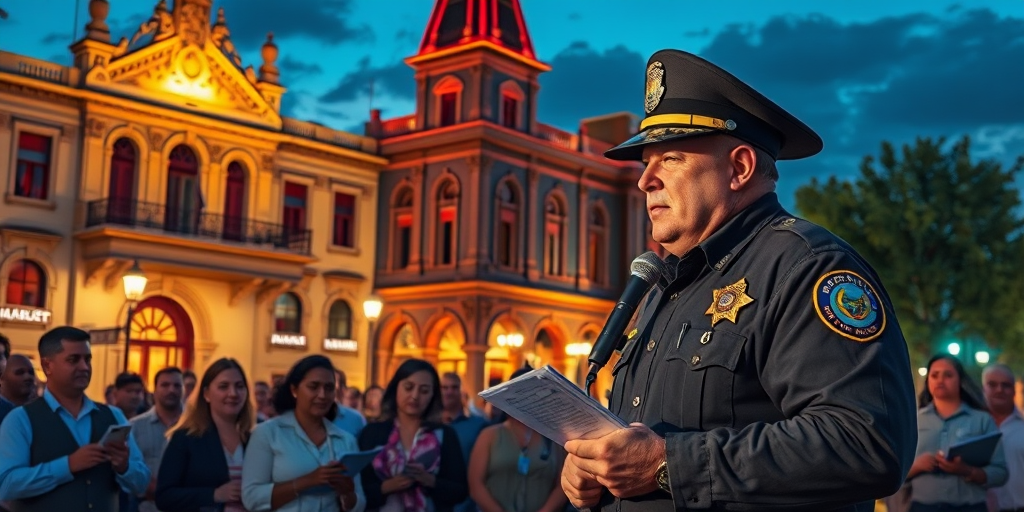Mission Police Department Partners with UTRGV for Mental Health Training
In a significant stride toward improving mental health crisis responses, the Mission Police Department has established a partnership with the University of Texas Rio Grande Valley’s (UTRGV) School of Medicine. This collaboration aims to equip law enforcement officers with critical skills needed for handling mental health crises effectively. The initiative, rooted in the PROSPER training program, highlights the importance of enhancing community care and response strategies across the Rio Grande Valley (RGV).
A Proactive Approach to Mental Health
Under the guidance of the PROSPER program, officers from various departments, including the Mission Police Department, U.S. Border Patrol, and Brownsville Police Department, participated in an intensive eight-hour training session. This program focuses on essential competencies such as suicide risk assessment, clinical decision-making, and crisis intervention strategies. Such training is vital in ensuring that officers are not only protectors but also connectors who can guide individuals toward necessary support services.
According to Mission Police Chief Cesar Torres, the initiative is about prioritizing compassion and preparedness. “Our goal is to ensure that every person in crisis is met with understanding, support, and a pathway to help,” he emphasized.
Local Impact on the RGV Community
The Rio Grande Valley, known for its vibrant communities and cultural diversity, faces unique challenges related to mental health. With various socioeconomic factors influencing these challenges, the training is a timely response to an escalating need for specialized crisis intervention. For Valley residents, the presence of well-trained officers offers reassurance that mental health concerns will be addressed with sensitivity and expertise.
Dr. Lisa Perez, a psychologist in McAllen, underscored the program’s significance. “Mental health crisis intervention training is crucial, especially in diverse communities like the Valley. Equipping officers with these skills will foster more trust between law enforcement and the community, ultimately leading to more effective support for individuals in need,” she noted.
Building on Past Efforts
This collaboration builds on the RGV’s ongoing efforts to enhance public safety and mental health awareness. Previous community workshops and dialogues have laid the groundwork by highlighting the importance of mental health education. There is an acknowledgment among local leaders that addressing mental health proactively contributes to overall community well-being and resilience.
Future Implications for the Valley
The implications of such training extend beyond immediate crisis response. By adopting this model, other regions in Texas and broader South Texas could follow suit, creating a network of trained officers equipped to handle various mental health scenarios. This foresight not only enhances public safety but also integrates mental health care into the fabric of public service, nurturing a more compassionate approach.
Challenges remain, including ensuring ongoing training support and measuring effectiveness. However, the initiative represents a pivotal step forward in aligning law enforcement practices with contemporary social needs.
Diverse Perspectives on the Initiative
While many community members and stakeholders support the initiative, there are varying perspectives. Some community members advocate for even more extensive mental health training across different sectors. “Training law enforcement is a good start, but expanding these efforts to other public-facing roles, like educators and healthcare providers, could amplify the positive impact on our community,” suggested Maria Gonzalez, a local mental health advocate.
Nonetheless, critics express concerns about funding and resource allocation, urging a balanced approach to infrastructural investments.
Connecting the Community
Community members are encouraged to engage with ongoing mental health education efforts. The Mission Police Department, along with UTRGV, plans to host public forums to discuss the outcomes of the initiative and gather resident feedback. Such dialogues are crucial for making continuous improvements and addressing community-specific needs.
Staying Informed and Connected
Residents are urged to stay informed about mental health resources available within the Valley. Local organizations and online platforms offer guidance and support for those navigating mental health challenges. The KRGV FIRST WARN 5 Weather app also provides real-time updates on community news and resources, ensuring Valley residents are always connected.
In conclusion, the partnership between the Mission Police Department and UTRGV signifies a progressive step toward integrating mental health care into community safety initiatives. As it continues to roll out, this initiative holds promise for fostering a more understanding, supportive community environment—reflective of the resilience and spirit of the Rio Grande Valley.
For more information or to participate in upcoming forums, residents can contact the Mission Police Department at [phone number] or visit their official website.







